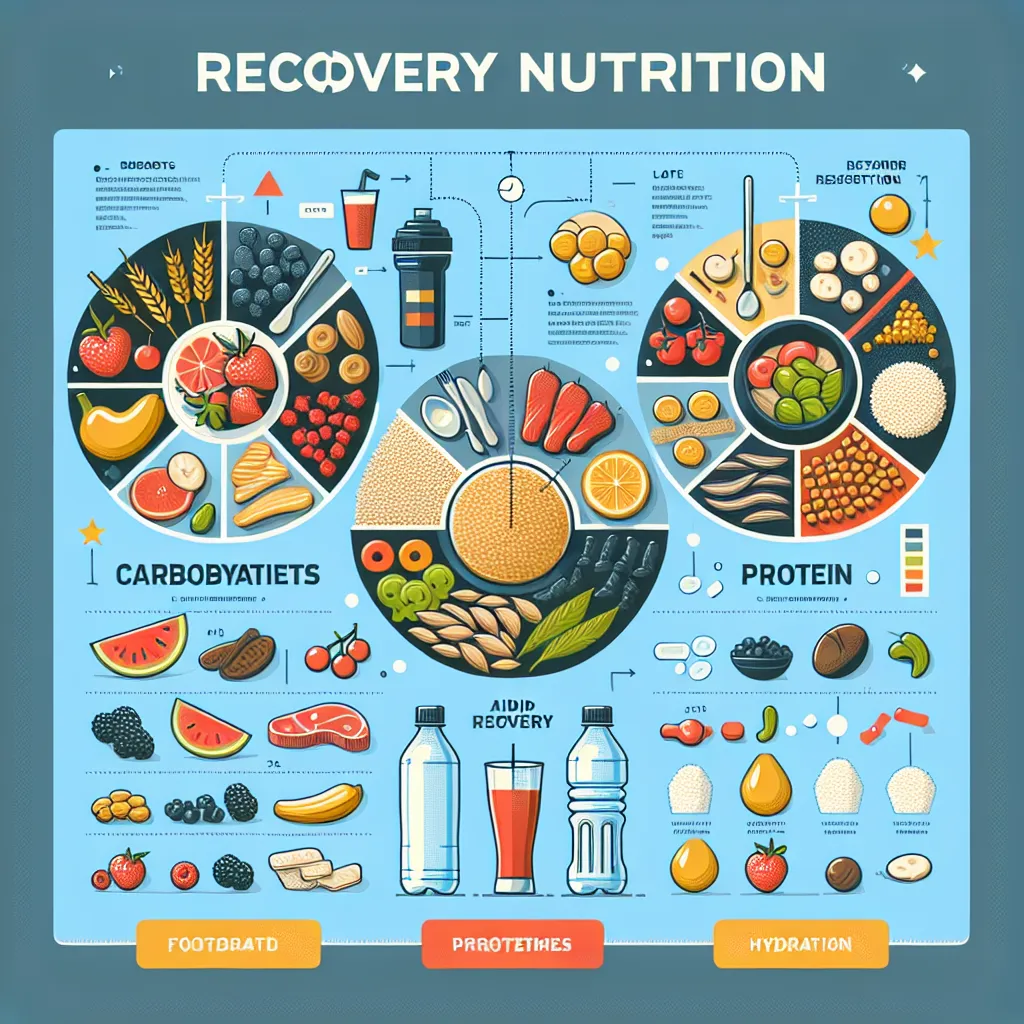‘Recovery nutrition’ is a crucial concept in sports science and athletic performance. Let’s break it down:
- Definition: The process of replenishing nutrients and energy stores in the body after intense physical activity or exercise.
- Part of speech: Noun phrase
- Pronunciation: /rɪˈkʌvəri njuːˈtrɪʃən/
This term is particularly relevant in the context of sports medicine, fitness, and athletic training. Understanding ‘recovery nutrition’ is essential for athletes, fitness enthusiasts, and anyone interested in optimizing their post-exercise regimen.
 Recovery Nutrition Concept
Recovery Nutrition Concept
Context and Usage of ‘Recovery Nutrition’
Examples in Context
-
After the marathon, Sarah focused on her recovery nutrition to replenish her glycogen stores and repair muscle damage.
Analysis: This sentence demonstrates the practical application of recovery nutrition in endurance sports. The term is used to describe the specific nutritional strategy employed after a demanding physical event.
-
The sports nutritionist emphasized the importance of recovery nutrition in the team’s training program to enhance performance and reduce injury risk.
Analysis: Here, ‘recovery nutrition’ is presented as a key component of a professional sports team’s regimen, highlighting its role in both performance enhancement and injury prevention.
-
“Recovery nutrition is not just about what you eat, but also when you eat it,” explained the fitness coach during the IELTS preparation seminar.
Analysis: This example showcases how the concept might be discussed in an academic or educational context, which is particularly relevant for IELTS candidates.
-
The study on elite athletes revealed that proper recovery nutrition could significantly reduce muscle soreness and accelerate the return to peak performance.
Analysis: This sentence illustrates the use of the term in a scientific context, emphasizing its measurable benefits in athletic performance.
-
“Without adequate recovery nutrition, all your hard work in the gym might go to waste,” warned the personal trainer.
Analysis: This example uses ‘recovery nutrition’ to stress its critical role in maximizing the benefits of exercise, making it relevant to a broader audience beyond professional athletes.
Common Contexts
‘Recovery nutrition’ is frequently encountered in:
- Sports science textbooks and research papers
- Fitness and wellness magazines
- Athlete interviews and sports documentaries
- Nutritional supplement marketing materials
- Health and fitness blogs or podcasts
Frequency in IELTS
‘Recovery nutrition’ and related concepts are moderately common in IELTS, particularly in:
- Reading passages about sports science or health
- Listening sections featuring interviews with athletes or nutritionists
- Writing Task 2 essays on topics related to health, fitness, or sports
- Speaking Part 3 discussions about exercise, health trends, or professional sports
Understanding this term can be beneficial across all sections of the IELTS test, especially for candidates interested in health sciences or sports-related fields.
Vocabulary Analysis
Word Structure
‘Recovery nutrition’ is a compound noun phrase consisting of two words:
- Recovery (noun): /rɪˈkʌvəri/ – The process of returning to a normal state after a period of difficulty.
- Nutrition (noun): /njuːˈtrɪʃən/ – The process of providing or obtaining the food necessary for health and growth.
Synonyms and Antonyms
Synonyms:
- Post-exercise refueling (noun phrase): /pəʊst-ˈeksəsaɪz riːˈfjuːəlɪŋ/ – The act of replenishing energy stores after physical activity.
- Nutritional recovery (noun phrase): /njuːˈtrɪʃənəl rɪˈkʌvəri/ – The process of restoring nutritional balance after exertion.
- Restorative eating (noun phrase): /rɪˈstɔːrətɪv ˈiːtɪŋ/ – Consuming food with the intention of aiding bodily recovery.
Antonyms:
- Pre-workout nutrition (noun phrase): /priː-ˈwɜːkaʊt njuːˈtrɪʃən/ – Nutritional strategies employed before exercise.
- Fasting (noun): /ˈfɑːstɪŋ/ – The act of abstaining from food for a period of time.
Memorization Techniques
Mind Mapping
Create a mind map with ‘Recovery Nutrition’ at the center, branching out to related concepts:
- Macronutrients (Proteins, Carbohydrates, Fats)
- Micronutrients (Vitamins, Minerals)
- Hydration
- Timing (Immediate post-exercise, 2 hours post-exercise)
- Goals (Muscle repair, Glycogen replenishment, Inflammation reduction)
Storytelling Technique
Imagine an athlete named Alex:
“After an intense workout, Alex focuses on recovery nutrition. She quickly consumes a protein shake to start muscle repair, follows it with a banana for quick-absorbing carbs, and sips on an electrolyte drink to restore hydration. Two hours later, she enjoys a balanced meal to complete her nutritional recovery process.”
This story encapsulates key elements of recovery nutrition, making it easier to remember the concept and its components.
Practice Exercises
-
Write a paragraph explaining the importance of recovery nutrition for a marathon runner.
-
Create a sample meal plan for optimal recovery nutrition after a high-intensity workout.
-
Compare and contrast recovery nutrition needs for endurance athletes versus strength athletes.
-
Discuss how recovery nutrition might differ for professional athletes compared to recreational gym-goers.
-
Explain how understanding recovery nutrition could be beneficial in answering questions in an IELTS Academic Reading passage about sports science.
Conclusion
Mastering the concept of ‘recovery nutrition’ is valuable not only for IELTS success but also for a deeper understanding of sports science and health. This term encompasses a wide range of nutritional strategies aimed at optimizing post-exercise recovery, making it a versatile addition to your vocabulary.
Remember to practice using this term in various contexts, whether you’re discussing general fitness trends or analyzing specific athletic performance strategies. By incorporating ‘recovery nutrition’ into your active vocabulary, you’ll be better prepared to tackle related topics in all sections of the IELTS exam.
We encourage you to share your experiences with learning and using this term in the comments below. How might you apply the concept of recovery nutrition in your daily life or studies? Do you have any questions about using this term in the IELTS exam? Let’s continue the discussion and enhance our understanding together!
For more insights into nutrition-related topics that may appear in IELTS, check out our articles on race nutrition and pre-workout nutrition.


